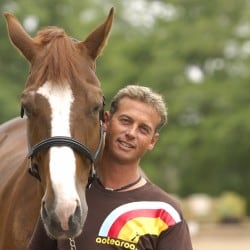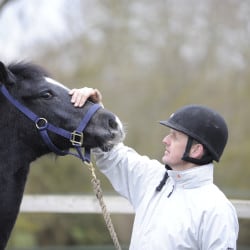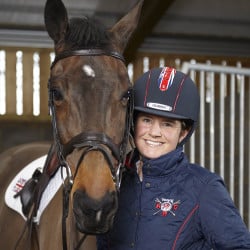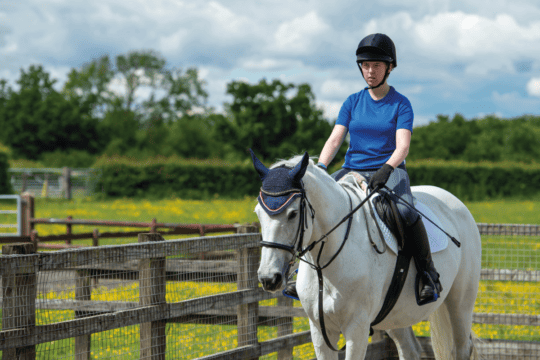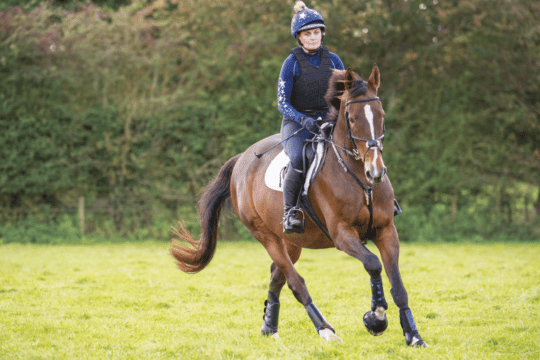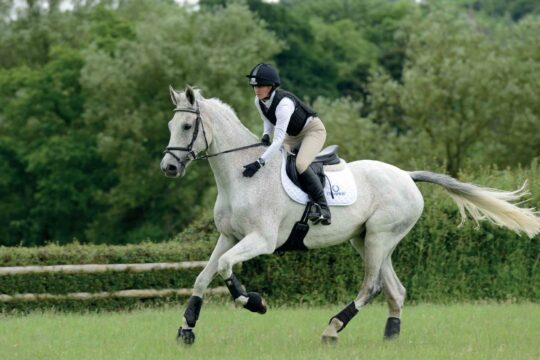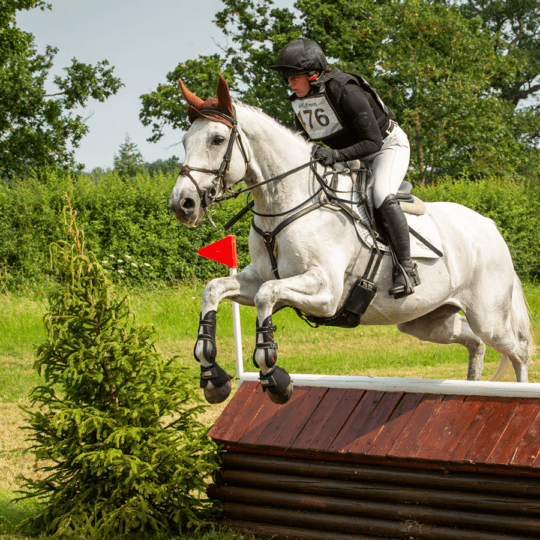Sometimes things don’t go as planned but the way you deal with it can make a huge difference to what happens next, says Alison Buttery
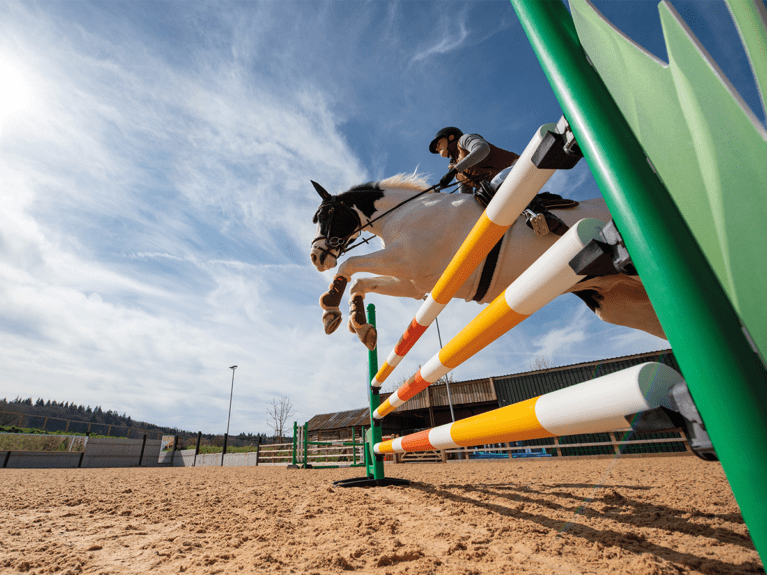
Maybe you can’t catch your horse to go out for a hack, he’s lost a shoe on the morning of an event, or a schooling session hasn’t gone well. Perhaps you’ve had a fall. Whatever the reason, it’s okay to feel disappointed, frustrated and down for a while – we’re only human, after all.
While goals can be a valuable way to maintain motivation and challenge ourselves to take steps toward our dreams, by working towards a target we open ourselves up to the possibility of not achieving what we wanted. When we’re in that place, it can feel vulnerable, and if we’re not careful we end up beating ourselves up for falling short. But is there a way to avoid this cycle?
A big impact
So, what happens when something goes wrong or we don’t have the best experience that we’d hoped for?
Well, at any given moment, our mind is busy filtering and managing thousands and thousands of pieces of information from the world around us – and from our internal experiences – to efficiently interpret and make sense of what’s happening and what we’re doing.
Our minds use all kinds of processes to decide what information’s important and what isn’t relevant or useful, with the aim of keeping us safe and well. From an evolutionary perspective, this process has enabled the human race to survive. There’s little point admiring a beautiful sunset and landscape if a sabre-toothed tiger is about to eat us!
The trouble with this is that our mind is programmed to find the negatives, risks and threats to our survival, whether they’re real or imagined, and this is where our mind can play tricks on us. When things happen around us, our mind will automatically scan and evaluate the situation looking for how it might harm us. In evolutionary terms, our mind hasn’t yet caught up with the modern world where we’re no longer likely to be eaten by predators.
The system in action
When we have a fall, a fence down, some constructive feedback from a judge, a tricky hack, or a challenging schooling session, our mind will often only see what went ‘wrong’ and blow it up out of proportion. It’s an entirely normal and human response to a perceived threat.
When we react in this way, which is an automatic response, it’s common for us to experience a deluge of negative thoughts or uncomfortable emotions, and we can quickly start to spiral downwards. The trouble is, this pattern can become habitual and cause us to experience stress and anxiety, and stop us from enjoying our hobby. When we feel low it can, and does, affect how well we ride and may have a negative impact on our relationship with our horse.
But I promise there’s good news. There are some simple and effective ways to manage your mindset when things don’t go to plan, and to become more resilient to the inevitable challenges of riding and owning horses.
Deal with it
Sometimes we find ourselves overwhelmed by the negative narrative in our mind, and get stuck in a cycle of rumination and unhelpful emotions.
One of the most powerful ways to deal with a bad day or a challenging experience is to write down what you’re thinking and feeling in an honest and non-judgemental way. It can be a truly cathartic experience to empty all the noise in your mind out onto paper as it allows you to process, examine and reflect on what happened – and, ultimately, find a way forward. The key is to write using the exact words and language that are happening in your mind – no filters or adjustments needed.
If you’re not used to writing in this way, it can be useful to use questions as prompts. You might find it helps to explore the event or scenario by using the following framework.
Imagine you’re a police officer or lawyer tasked with investigating the situation or event in a factual, objective way.
Consider…
- what actually happened?
- what did not actually happen?
- what was the primary cause of the incident (don’t get drawn into blaming yourself, other people or your horse here)?
- how could the incident have been prevented?
- what have you learned from this that will help you in similar situations in the future?
- what specific action can you take to improve your riding, relationship with your horse or confidence. Or, how can you become more resilient in the future?
Manage your emotions
The single most important thing to do in that moment where you’re feeling disappointed, embarrassed, stressed or anxious, is to notice and accept how you’re feeling.
It’s very easy to become a victim to the unhelpful or uncomfortable emotions. When you’re able to step back from them, notice what’s happening and identify your feelings, you become more self-aware and objective. This means that you’re more likely to be able to alter your mindset and take things less personally or seriously.
Find perspective
When you’re feeling down, it’s important to search for some perspective around the situation you’re in. Ask yourself, “How else could I look at this situation?”. You might find it hard at first to even begin to see how you could answer, but I challenge you to find other possibilities and opportunities in how you consider the situation.
It can be so powerful to think about how your coach or instructor might interpret the circumstances, what a close friend might say or how a role model might shed a different light on what’s going on.
For most people, their perception is their reality, which is how we can get stuck in a singular view of the world. When we’re able to consider things from another point of view, we become more objective and gain other, more constructive, ways of thinking and feeling.
Banish the blame
Contrary to how it might feel, your horse doesn’t spend his time thinking up ways to be difficult. In fact, he can’t – horses simply don’t have the capacity or inclination to think up creative ways to cause us problems.
A horse’s primary form of communication is through his body language and positioning, and as such, he can only tell us that he’s confused, worried or in pain through his behaviour.
If your bad day comes as the result of an issue with your horse, resist the urge to blame him or yourself for whatever’s happened. He isn’t ‘doing it on purpose’, nor has he ‘planned it’.
Instead, consider what he’s trying to tell you and how you might improve your communication, so that you’re more able to understand each other effectively, have a better experience and, ultimately, more fun together.
Feedback over failure
It’s all too easy to beat ourselves up when something goes wrong, and if you allow yourself to continually self-sabotage in this way, you’ll gradually erode any confidence or positivity you started with.
Whatever’s happened, find at least one positive and one constructive thing you can learn from the experience, no matter how big or small. Consciously look for things you can learn about yourself or your horse, which will help you take the next steps towards your equestrian goals.
The key here is to take action as knowing isn’t the same as doing. Use the experience to help you make progress and prevent or manage similar situations in the future, then you’ll be able to move on.
Remove ‘should’
It’s such a simple word but it pops up all the time in what we say and how we think. When we say, “I should be able to…” or “I shouldn’t have…”, it’s a form of self-criticism and blocks our ability to achieve goals by reinforcing any belief that we’re not good enough. The things we ‘should do’ but don’t are often those that don’t really fit with what we actually want to do. They don’t align with our core values as a rider, and ultimately it becomes a no-win situation as a cycle of not doing the thing we think we ‘should do’, but then are never really motivated to get on with because we don’t want to.
When we experience a bad day, it’s easy to look back and think “I should have…” or “I shouldn’t have…” but this keeps us stuck in a spiral of negative thoughts, emotions and beliefs.
Get support
If you’re struggling with something in particular with your riding or your horse, it’s important to get help from experienced and qualified people that you trust. Ask for advice from your coach, vet, physio, farrier or another relevant expert so you can figure out how to manage any practical or management issues that might have caused your ‘bad day’.
If you know that the issue was due to your own mindset or confidence challenges, then make it your priority to get help and support with that, too. It’s no good prioritising just one half of the partnership with your horse – a bit of accountability goes a long way!
On a good note
Remember, a bad day is just that. It doesn’t mean that the next day or ride will also be bad, nor does it mean that you’re a bad rider or, even worse, a bad person. We can’t always control what happens around us or to us, but we absolutely can choose how we res

